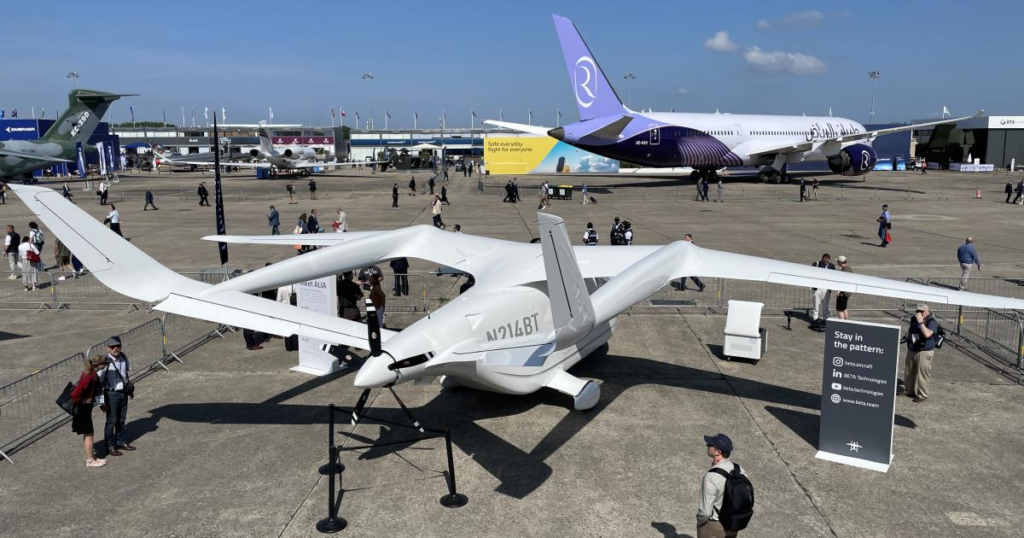In a major step towards sustainable aviation, Republic Airways, a leading regional airline in the United States, has announced that it will evaluate an all-electric aircraft from Vermont-based BETA Technologies. The airline is considering the electric plane as a potential solution for short-haul, regional flights, aiming to reduce both operating costs and carbon emissions in the future. The move signals a strong push within the airline industry towards greener aviation technologies, especially amid growing global concerns about climate change and fuel costs.
What Is BETA Technologies?
BETA Technologies is an aerospace company known for developing electric vertical takeoff and landing (eVTOL) and fixed-wing aircraft. Founded in 2017, BETA has been working to revolutionize transportation through clean-energy aviation solutions.

Its main project, the Alia-250c, is a fully electric aircraft designed for cargo and passenger use over regional distances. The aircraft is designed to fly up to 250 nautical miles on a single charge, with a payload capacity suitable for commuter or light cargo operations. It operates much more quietly than traditional aircraft and has the added benefit of lower maintenance and energy costs. More about BETA Technologies can be found on their official website.
Why Republic Airways Is Interested
Republic Airways operates feeder flights for major U.S. carriers like American Airlines, Delta Air Lines, and United Airlines. Its fleet mainly consists of Embraer regional jets. But as airlines face pressure to meet sustainability goals, electric aircraft present an opportunity to align with future environmental regulations.
In a statement, Republic Airways said that it would evaluate the performance, safety, and cost-efficiency of BETA Technologies’ electric aircraft. If successful, the airline hopes to use these aircraft on short regional routes, which typically operate under 250 miles. According to industry insiders, such short-haul routes are ideal for early electric aircraft applications due to battery range limitations.
Testing and Certification: A Long Road Ahead
The Federal Aviation Administration (FAA) must certify the aircraft before it can enter commercial service. BETA Technologies is currently undergoing testing and expects to achieve certification by 2026. Republic Airways’ role during the evaluation phase will be to assess the aircraft’s real-world usability in its operations, including ground infrastructure, recharging logistics, and turnaround times. This partnership could help shape the regulatory framework and infrastructure needed to support electric aviation, as more companies enter this growing field.
An Industry-Wide Shift Toward Electric
Republic Airways is not alone in its interest. Other major players such as United Airlines, JetBlue, and Alaska Airlines have already invested in electric or hybrid-electric aircraft startups. The global aviation industry contributes about 2–3% of global CO₂ emissions, and governments worldwide are pressuring airlines to transition to cleaner alternatives.
A growing number of airports and aviation authorities are now exploring electric infrastructure, including charging stations and hangar upgrades, to support the next generation of aircraft. BETA Technologies has already established partnerships with other companies, including UPS and Blade Urban Air Mobility, and is building a nationwide network of electric charging stations.
Benefits of Electric Aircraft for Regional Airlines

There are several reasons why regional airlines like Republic Airways are well-suited for electric aircraft adoption:
Lower Fuel Costs: Electricity is cheaper than aviation fuel, especially over short distances
Less Maintenance: Electric motors have fewer moving parts, which could reduce maintenance downtime and costs
Quieter Flights: Electric aircraft produce far less noise, reducing noise pollution around regional airports
Carbon Reduction: These aircraft can significantly reduce greenhouse gas emissions when powered by renewable energy sources
Electric aircraft could also open new point-to-point air travel opportunities between smaller cities that currently lack air service due to economic constraints.
Challenges Ahead
Despite the enthusiasm, several technical and economic challenges remain. Battery technology is still evolving, and range limitations make electric aircraft unsuitable for long-distance flights at this stage. There are also infrastructure hurdles, such as building charging stations at airports, training maintenance crews, and updating flight operation systems. Additionally, FAA certification is a rigorous and time-consuming process. Any delays could push back commercial deployment timelines.
A Vision for the Future
Still, Republic Airways’ move to explore electric aviation represents a strategic investment in the future. As battery and aircraft technology improves, it’s likely that more regional and eventually mainline carriers will adopt electric-powered fleets. Rick Zeni, Republic Airways’ Chief Innovation Officer, commented:
“We see BETA Technologies’ aircraft as a powerful tool to reshape regional travel. This evaluation marks our commitment to exploring zero-emission aviation solutions.”
With increasing pressure from regulators, consumers, and climate watchdogs, the aviation industry is entering a new era. Republic Airways, with its expansive regional network, is in a strong position to be a first mover in electric regional air transport.
Final Thoughts
The evaluation of BETA Technologies’ electric aircraft by Republic Airways could become a turning point for electric aviation in the U.S. While the road to full implementation will be long and complex, the potential rewards—cleaner skies, lower costs, and more efficient travel—are too significant to ignore. For further updates on sustainable aviation developments, visit Simple Flying and Electric VTOL News. As battery innovation accelerates and infrastructure investments grow, electric aircraft may soon become a common sight in the skies—especially for regional carriers ready to embrace the future.
Also Read – New York Approves AI Bill to Save Humanity from Danger






